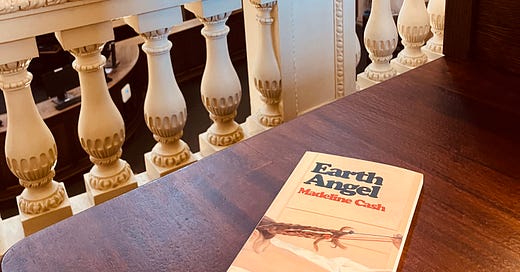Madeline Cash’s Earth Angel took me back to the mid-2010s, when alt lit was big on the internet and people did things like publish books of Selected Tweets and write Vice articles about smoking weed out of a bong made from a copy of Infinite Jest. Earth Angel is alt lit 2.0, with blurbs inside from Tao Lin and religious meme account @ineedgodineverymoment. Its stories have previously been published by first-wave alt lit press Muumuu House as well as newer Dimes Square print-only magazine The Drunken Canal. Madeline Cash’s own Forever Magazine, its homepage a hyperlinked pearly gates gif against Y2K cloudy blue sky, is denying the Thiel-funded allegations.
Like earlier alt lit, the stories in Earth Angel are very online. ‘We avoided seed oils together,’ says the deadbeat narrator of Hollywood Tours whose girlfriend does drone warfare military strategy for video games. The title of The Jester’s Privilege references a meme that was big in NYC posting circles about a year ago, getting at the layers of irony that let you say things on the internet without anyone knowing if you actually believe them or if you’re just doing a bit. ‘I’m the jester. My societal role allows me to speak truth to power. I’d say you are too but you don’t seem to participate in enough self-parody,’ says Dorian, the narrator’s boss at a marketing agency that does ‘reputation laundering’ for crypto-fascists, puppy mills, lead-heavy paint companies. ‘I have been working at Fresh Start for just under a year,’ says the narrator, ‘For my anniversary, I hope they give me a new desk chair.’
The language of the internet has its form and tone. In an interview, Cash says that she picks ‘two things that are at odds that I think would be funny if they were paired.’ The vaguely absurd combination of specific things is the formula for being funny online, like ‘I only have a brief window of time before the pizza digests irreversibly into my system so I induce vomiting outside of a Polish church.’ It’s cringe to care about things too much; infographics, petitions, hectoring and urgent calls to action are out. Critique is done by placing extremely bad things next to extremely banal ones—puppy mills and desk chairs—to reveal the contradictions of neoliberalism, the alienation and atomisation of a generation trying to build our adult lives on dating apps and Zoom jobs. ‘I conclude this week’s virtual therapy session, like always, by lamenting life’s lack of meaning,’ Cash writes.





